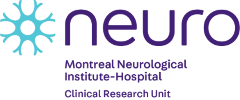Testing a targeted treatment for FSHD

A new study at The Neuro’s Clinical Research Unit hopes to deliver the first targeted treatment for a common form of Muscular Dystrophy
By Sophie Lorenzo
May 1, 2022
Keith Martin was in high school when he started noticing that he wasn’t performing in sports like he used to. He loved racket sports and hockey but was experiencing a decrease in mobility and strength and he had no explanation for it. Over the next five years, he was seen by many physicians but received no clear diagnosis. It was when he moved to Vancouver for university that he was finally referred to a neurologist who diagnosed him with fascioscapulohumeral dystrophy (FSHD), a rare progressive neuromuscular condition.
“There was no family history; it was really out of the blue,” explains Keith who has a Master’s degree in Engineering and is a certified project management professional. “At first, ironically, I felt a lot of relief – at least of having an answer. But shortly after, I was left with a lot of uncertainty for what it meant for my life, for my future. It was a difficult period.”
Not so rare
Keith is one of 500,000 people in Canada – and 3 million worldwide – with a rare disease. FSHD can present at any time, including in childhood, though it is often diagnosed around early adulthood. It is one of the most common forms of muscular dystrophy in which muscle cells will die over time, in this case mainly affecting the face, upper body and legs.
While there are no treatments for most rare conditions – including FSHD — clinical trials often offer the only chance to try a treatment that could slow or stabilize the progression of the illness. A new study at the Clinical Research Unit at The Neuro (Montreal Neurological Institute-Hospital) is studying a novel therapy which it’s hoped will lead to a potential treatment for FSHD.
“This is a progressive disorder that can be very debilitating. As muscle cells die over time, an individual will lose strength in facial muscles, which can really impact social interaction and communication because they can’t smile. In addition to weakening their arms and legs, it also impacts the muscles of respiration,” explains Dr. Erin O’Ferrall, a neurologist and the site principal investigator for a new study at the Clinical Research Unit (CRU).
Finding the right target
“FSHD is genetically complex, making it harder to diagnose — the genetic testing is not as simple to perform or interpret as it is for other forms of Muscular Dystrophy,” says Dr. O’Ferrall. “It is also unusual in that Muscular Dystrophy is usually due to a gene product that is missing, resulting in the death of muscle cells. Conversely, FSHD results from a gene which is overexpressed and as a result kills muscle cells.”
Thankfully, research has made strides in the past decade. We now know that the DUX4 gene turns on a specific pathway making it overactive, causing muscle cell death. “There has been a real explosion in my field. I would not have imagined 10 years ago that we would be looking at targeted therapies,” explains Dr. O’Ferrall. “The investigational drug being tested in this trial is specifically targeted to turn down the volume or to shut off the DUX4 gene entirely so that the muscle can live. If this medication is shown to be effective, FSHD would be the first treatable adult-onset form of muscular dystrophy.”
Now more than 15 years after his diagnosis, Keith has symptoms of generalized weakness, particularly in his back and core. He can walk independently but his legs have weakened over time.
“Sports was a big part of my life. When you love to play and to compete, losing that is hard. I would love to lace up a pair of skates again,” he explains. “People want to know there will be options for potential treatments down the road. Research gives us hope. Many are watching closely to hopefully see a successful result for people living with FSHD.”
**
The CRU at The Neuro is one of only 3 sites in Canada with this study. Patients are accepted from outside the province or country.
For more contact, nm.neurocru@mcgill.ca, or visit cru.mcgill.ca/nm.



